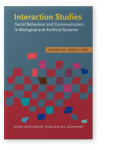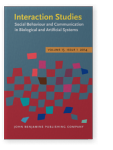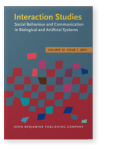Britta Wrede
List of John Benjamins publications for which Britta Wrede plays a role.
2021 Why robots should be technical: Correcting mental models through technical architecture concepts Interaction Studies 22:2, pp. 244–279 | Article
Research in social robotics is commonly focused on designing robots that imitate human behavior. While this might increase a user’s satisfaction and acceptance of robots at first glance, it does not automatically aid a non-expert user in naturally interacting with robots, and might hurt their… read more
2014 Tutoring in adult-child interaction: On the loop of the tutor’s action modification and the recipient’s gaze Interaction Studies 15:1, pp. 55–98 | Article
Research of tutoring in parent-infant interaction has shown that tutors – when presenting some action – modify both their verbal and manual performance for the learner (‘motherese’, ‘motionese’). Investigating the sources and effects of the tutors’ action modifications, we suggest an interactional… read more
2013 What is the link between emotional
and communicative alignment in interaction? Alignment in Communication: Towards a new theory of communication, Wachsmuth, Ipke, Jan de Ruiter, Petra Jaecks and Stefan Kopp (eds.), pp. 205–224 | Article
In accordance with accumulating evidence from research, we assume a strong but flexible relation between emotional and communicative alignment in interaction. The communicative function of emotional adaptation, the processing of emotions on all linguistic levels and the empirical evidence in… read more
2011 Mindful tutors: Linguistic choice and action demonstration in speech to infants and a simulated robot Interaction Studies 12:1, pp. 134–161 | Article
It has been proposed that the design of robots might benefit from interactions that are similar to caregiver–child interactions, which is tailored to children’s respective capacities to a high degree. However, so far little is known about how people adapt their tutoring behaviour to robots and… read more



